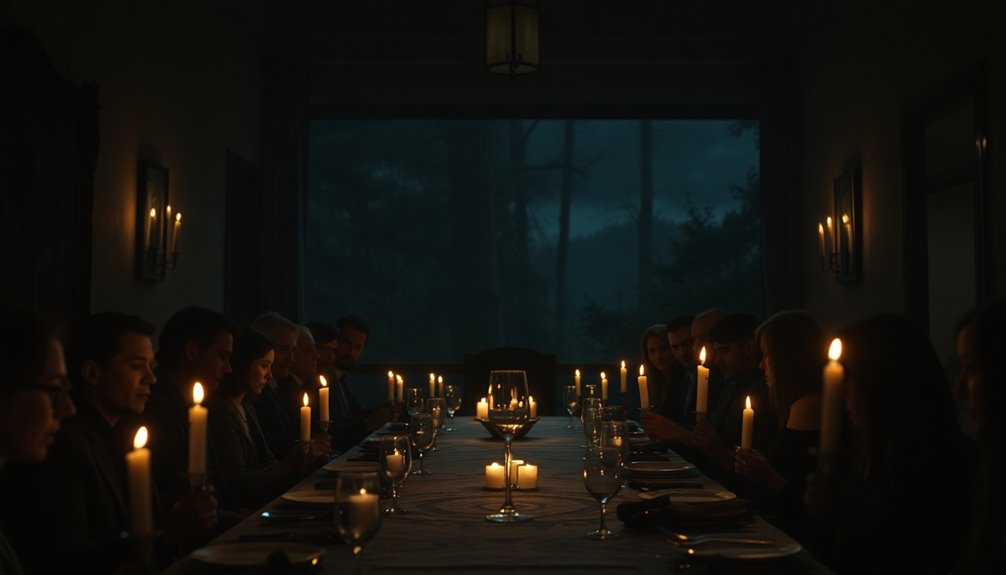If you’re looking to explore the dark side of cults, Netflix has some chilling movies just for you. Check out *Midsommar*, where disturbing rituals unfold in a fictional commune. *Apostle*, *The Devil All the Time*, and *Get Out* each tackle themes of manipulation and control with terrifying results. You’ll also want to catch *Hereditary*, *The Perfection*, *Incantation*, and *The Invitation*. These films will keep you on the edge of your seat, so keep going to uncover their sinister tales!
Key Takeaways
- *Apostle* (2018) features a chilling narrative about blind faith and redemption within a sinister cult on a remote Welsh island.
- *The Devil All the Time* (2020) critiques religious zealotry and societal violence, showcasing manipulation through interconnected character stories.
- *The Perfection* (2018) explores ambition and trauma in classical music, revealing cult-like abuse and unexpected twists.
- *Get Out* (2017) combines psychological horror with social commentary, addressing race and manipulation in a chilling narrative.
- *Midsommar* critiques toxic dynamics within a fictional pagan commune, exploring the dangers of blind adherence to cult ideologies.
Apostle (2018)

In *Apostle* (2018), you dive into a chilling narrative set on a remote Welsh island in 1905. The story follows Thomas Richardson as he attempts to rescue his sister from a sinister cult led by the enigmatic Prophet Malcolm. This cult engages in horrifying blood sacrifices, believing these offerings maintain the island’s fertility and appease a mysterious deity. As Thomas navigates the island’s eerie atmosphere, he confronts the dangers of blind faith and the lengths people will go for redemption. The film explores themes of isolation and the corrupting influence of power, ultimately leading to a symbolic transformation for Thomas, who becomes the island’s reluctant guardian after defeating the cult’s leader Malcolm Howe. This narrative resonates with the emotional volatility often seen in individuals involved with Borderline Personality Disorder, highlighting the consequences of extreme beliefs. With its unsettling imagery, *Apostle* stands out in the cult horror genre.
The Devil All the Time (2020)

Set against the haunting backdrop of rural southern Ohio and West Virginia, *The Devil All the Time* (2020) intricately weaves together the lives of its characters, revealing the pervasive influence of violence and religious zealotry. This Southern Gothic psychological thriller spans from the end of World War II to the 1960s, delving into the darker aspects of human nature. You’ll encounter morally ambiguous characters like Arvin Russell, who grapples with protecting his loved ones amidst chaos. The film critiques the exploitation of religious fervor through figures like the predatory Reverend Teagardin and the chilling duo of Carl and Sandy Henderson. American Megachurch elements are evident throughout the narrative, emphasizing the intersection of faith and capitalism. The characters’ struggles for power and control mirror the gaslighting tactics often employed by narcissists, highlighting the psychological turmoil faced by victims. With stellar performances and a non-linear narrative, it paints a chilling portrait of corruption and the blurred lines between good and evil.
The Perfection (2018)

*The Perfection* (2018) delves into the dark underbelly of ambition and trauma in the world of elite classical music.
You follow Charlotte Willmore, a former cello prodigy, as she seeks out Lizzie, the new star pupil of her old school.
What seems like a reunion quickly spirals into a sinister plot filled with revenge and manipulation.
Directed by Richard Shepard, the film explores themes of cults and abuse, particularly through the malevolent character Anton, who leads the Bachoff Academy. The film features a sinister encounters that keep the audience guessing throughout its dark and suspenseful narrative. The manipulation seen in the film mirrors the fear of intimacy often depicted in dreams about cults.
With gripping twists and shocking moments involving hallucinogenic drugs, you’ll find yourself on the edge of your seat.
Though it received mixed reviews, its powerful performances and chilling atmosphere make it a memorable psychological horror thriller.
Get Out (2017)

Exploring the dark and twisted elements of human nature continues with *Get Out* (2017), a film that masterfully blends psychological horror with sharp social commentary.
You’ll follow Chris Washington, a young Black man, as he visits his white girlfriend Rose’s family, only to uncover their sinister intentions. The Armitage family embodies cult-like behavior, using hypnosis and manipulation to control their victims. The film, directed by Jordan Peele, highlights the dangers of complacent liberal attitudes toward racial issues, making it all the more relevant today. The themes of manipulation reflect how advance directives can lead to exploitation in vulnerable situations.
As Chris faces racial tensions and microaggressions in this predominantly white community, you’ll witness the chilling climax revealing their plot involving brain transplants into Black bodies.
With its critical acclaim and cultural significance, *Get Out* not only entertains but sparks vital discussions about racism and identity, making it a must-watch for horror fans.
Incantation (2022)

As you dive into *Incantation* (2022), you’ll find yourself immersed in a chilling tale that intertwines curses with supernatural horror.
Set in Taiwan, the film follows Li Ronan and her daughter Dodo as they navigate a world plagued by a malevolent deity known as Mother Buddha. The story reveals a cult-like community practicing esoteric Yunnan religion, drawing on Tantric Buddhism and unique rituals. The film’s narrative is inspired by a 2005 incident in Gushan District, Kaohsiung.
Presented in a gripping found footage style, *Incantation* invites you to engage directly, breaking the fourth wall and encouraging audience participation.
With a 75% approval rating on Rotten Tomatoes, it has become Taiwan’s highest-grossing horror film, sparking debates and captivating viewers worldwide since its Netflix release.
Prepare for an unsettling exploration of misfortune and blessing.
Midsommar (2019)

Set against the backdrop of a seemingly idyllic midsummer festival in rural Sweden, *Midsommar* (2019) draws you into the unsettling world of the Hårga commune. You follow Dani and Christian, an American couple, alongside their friends as they experience the festival, which occurs only every 90 years. The Hårga’s pagan rituals, including disturbing human sacrifices and mating ceremonies, reveal their dark side. As Dani seeks empathy and belonging, the film critiques modern isolation, showcasing the toxic dynamics of her relationship with Christian. The story ultimately culminates in Dani’s transformation into a figure of empowerment, as she confronts and defeats Christian in a chilling finale. The film’s exploration of existential themes encourages viewers to reflect on their own relationships and societal pressures. Bright visuals contrast with the horror of the commune’s practices, while hallucinatory elements disorient you. *Midsommar* serves as a chilling commentary on the dangers of blind adherence to cult ideologies, leaving you both captivated and disturbed.
The Invitation (2015)

After the unsettling journey through the Hårga commune in *Midsommar*, you might find *The Invitation* (2015) equally gripping yet distinctly different in its approach to cult dynamics.
Set in the Hollywood Hills, you follow Will as he attends a dinner party at his ex-wife Eden’s home. What starts as a seemingly innocent gathering quickly spirals into a psychological thriller, revealing the sinister cult known as “The Invitation” that influences the characters’ actions throughout the evening. This film serves as a chilling exploration of how astrological compatibility can deepen interpersonal connections, often leading individuals to overlook red flags.
The film explores grief and trauma while showcasing how vulnerability can lead to manipulation. As tension builds, you’ll feel the paranoia seep into the atmosphere, culminating in a chilling climax.
With a sharp critique of cult allure, this movie serves as a haunting reminder of the dangers lurking beneath the surface.
Hereditary (2018)

When you dive into *Hereditary* (2018), you’re thrust into the chilling world of the Graham family, whose intricate dynamics unravel following a series of tragic events.
The death of matriarch Ellen triggers a horrifying chain reaction, especially after the accidental death of her daughter, Charlie. As supernatural occurrences plague the family, you’ll uncover their dark ancestral ties to a cult worshiping Paimon, the demon king.
Annie, played by Toni Collette, struggles with grief and unraveling family secrets, while Peter, her son, becomes increasingly ensnared in the horror. The film received no Oscar nominations, which is surprising given its strong performances and innovative storytelling. The emotional instability exhibited by the characters can echo the complexities of BPD traits that many individuals face.
Directed by Ari Aster, this film masterfully blends psychological tension with supernatural dread, leaving you questioning the true cost of family legacy and the haunting grip of trauma.
Frequently Asked Questions
What Psychological Themes Are Common in Cult Horror Movies?
In cult horror movies, you often encounter psychological themes like fear of the unknown and coercive control.
Characters face intense manipulation, highlighting their vulnerabilities and past traumas.
You’ll see the isolation that breeds paranoia and the struggle between conformity and rebellion.
These films also explore the impact of charismatic leaders, the desire for belonging, and the unsettling atmosphere they create, all while tapping into cultural anxieties and the power of suggestion.
How Do Cult Movies Reflect Societal Issues and Norms?
Imagine a mirror reflecting society’s deepest fears and desires. Cult movies do just that, showcasing issues like class disparity and political strife.
You see characters grappling with loneliness, desperate for belonging, which mirrors real-life struggles. These films symbolize the loss of control, as individuals surrender to charismatic leaders, echoing your own fears of autonomy.
Are There Any True Stories Behind These Cult Horror Films?
Absolutely, many cult horror films draw inspiration from real-life events and cults.
You’ll notice themes of psychological manipulation and control mirrored in these stories, reflecting the dark aspects of human behavior.
Films often reference notorious cults like the Manson Family or Jonestown, while others highlight historical figures or events.
What Makes a Cult Movie Effective in Creating Fear?
So, you think just any creepy setting can make a cult movie effective? Think again!
It’s all about how they exploit your fears—fear of the unknown, paranoia, and isolation. They use chilling techniques like low-key lighting and disorienting angles to keep you on edge.
Combine that with unsettling sound effects and unreliable narrators, and you’ve got a recipe for terror.
It’s not just a movie; it’s an invitation to your worst nightmares!
How Have Cult Movies Evolved Over the Years?
Cult movies have evolved significantly over the years.
You’ll notice they’ve shifted from early exploitation films to more experimental and transgressive storytelling. The rise of home video and streaming has made them widely accessible, allowing niche audiences to flourish.
You’ll find that these films now often resonate with specific subcultures, encouraging audience participation and fostering a sense of community.
Their unique style and themes continue to challenge societal norms, keeping them relevant and engaging.
Conclusion
So, as you dive into these chilling cult-centric films on Netflix, you might wonder: what draws people to such dark ideologies? Is it the search for belonging, or a deeper psychological need? Each movie offers a glimpse into the unsettling allure of cults, leaving you questioning not just the characters’ choices, but human nature itself. So grab your popcorn, settle in, and prepare to confront the unsettling truths lurking beneath the surface of these haunting tales.









